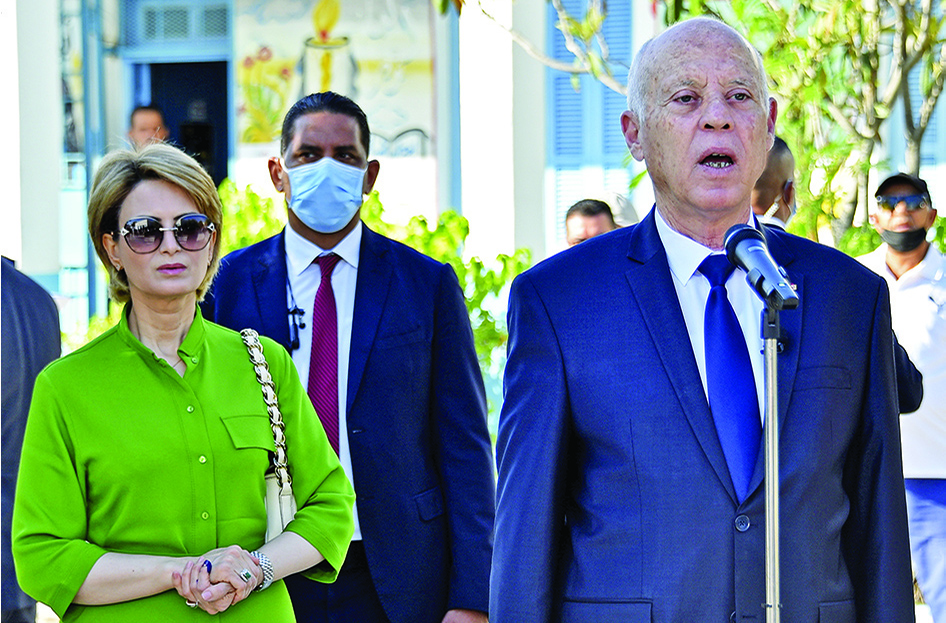TUNIS: Tunisians were voting Monday on a new constitution promoted by President Kais Saied, which has been criticised for giving his office nearly unchecked powers and threatening to install an autocracy in the birthplace of the Arab Spring. The referendum comes a year to the day after Saied sacked the government and froze parliament in a power grab that his rivals condemned as a coup.
His moves were however welcomed by many Tunisians fed up with a grinding economic crisis, political turmoil and a system they felt had brought little improvement to their lives in the decade since the 2011 overthrow of dictator Zine El Abidine Ben Ali. Few doubt Monday's vote will pass, but turnout will gauge Saied's popularity after a year of increasingly tight one-man rule that has seen scant progress on tackling the North African country's economic woes.
Early on Monday, a handful of voters had queued up waiting for the opening a polling station in Tunis, guarded by a pair of soldiers and four police officers. After casting their ballots, they emerged with purple ink on one finger to prevent fraud. The electoral board said by 0830 GMT an "encouraging" 6.3 percent of voters had cast ballots.
Speaking mid-morning, Saied told journalists the country faced a "historic choice" and a free vote. "Together we are founding a new republic based on genuine freedom, justice and national dignity," he said. Voter Imed Hezzi, a 57-year-old waiter, said he had "lots of hope" Saied would improve the country. "Tunisia will prosper from today onwards," he told AFP after casting his ballot. "The start of the new Tunisia is today."
'None of the safeguards'
Some 9.3 million out of Tunisia's 12 million people are eligible to vote. No minimum participation has been set for the constitution to pass, nor any provision made for a "no" result, and Saied's critics have warned Tunisia risks sliding back towards dictatorship.
The new text would place the head of state in command of the army, allow him to appoint a government without parliamentary approval and make him virtually impossible to remove from office. The president could also present draft laws to parliament, which would be obliged to give them priority.
The new charter "gives the president almost all powers and dismantles any check on his rule and any institution that might exert any kind of control over him," declared Said Benarbia, regional director of the International Commission of Jurists.
"None of the safeguards that could protect Tunisians from Ben Ali-type violations are there any more." Saied's charter would replace a 2014 constitution that was a hard-won compromise between Islamist-leaning and secular forces after three years of political turmoil.
His supporters blame the resulting parliamentary-presidential system and the dominant Islamist-influenced Ennahdha party for years of political crises and corruption. Saied's draft constitution was published this month with little reference even to an earlier draft produced by a committee he appointed himself.
Sadeq Belaid, a mentor of Saied who led the process, warned the president's first draft was far removed from that of the committee and risked creating a "dictatorial system". A slightly amended version did little to address such concerns. Opposition parties and civil society groups have called for a boycott, while the powerful UGTT trade union has declined to take a position.
Revolutionary 'correction'
Benarbia said the text "doesn't even envisage the possibility of a no vote". Saied, a 64-year-old law professor, won the 2019 presidential election in a landslide, building on his image as incorruptible and distanced from the political elite.
He has appeared increasingly isolated in recent months, mostly limiting his public comments to official videos from his office-often diatribes against domestic foes he brands as "snakes", "germs" and "traitors". He has vowed to protect Tunisians' liberties and describes his political project as a "correction" and a return to the path of the revolution. Mongia Aounallah, a 62-year-old retiree, said she hoped the referendum would lead to "a better life for our children's children".
"The schools are a catastrophe," she said. "The situation is catastrophic. Everything is catastrophic." Day labourer Ridha Nefzi agreed. "I came to vote to change the situation of the country," the 43-year-old said. "The country's run into a brick wall. But today we turn a new page."
But while Saied enjoys some popularity, that will be tested by soaring inflation, youth unemployment of 40 percent and a tough loan deal with the International Monetary Fund. Voting is set end at 10:00 pm (2100 GMT) and results are expected late Tuesday or early Wednesday. - AFP











